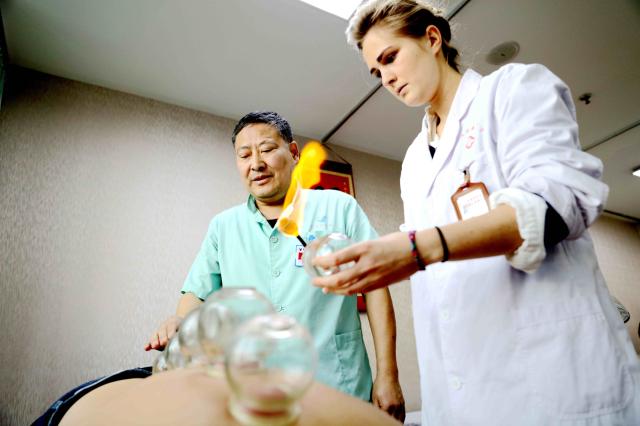Eight Chinese Traditional Medicine (TCM) universities, including leading institutions such as the Beijing University of Chinese Medicine (BUCM) and the Shanghai University of Traditional
Chinese Medicine, were recently removed from the World Directory of Medical Schools. Their graduates may no longer be eligible to practice abroad.
The World Directory, which comes under the aegis of the World Health Organization (WHO), has changed editors several times in the past five decades, during which traditional medicine schools, including those in China, India and South Korea, were listed along with Western medicine schools. The World Federation for Medical Education took over and revised the qualifying criteria for medical schools.
The move follows the inclusion of TCM in the WHO’s International Statistical Classification of Diseases and Related Health Problems. The document sets out international standards for categorizing diseases and diagnoses.
In an official letter to social media DeepTech, World Federation chairman David Gordon said the World Directory defines a medical school as an institution that enables students to “obtain a license to practice as a clinical medical doctor or physician” and that traditional medicine universities without a clinical medicine department do not qualify.
“Eight TCM schools were removed from the World Directory on November 1, 2019, because they did not offer a program of instruction leading to a qualification that is normally recognized as a medical qualification outside of China,” he wrote.
Following the delisting, China’s Ministry of Education published a statement calling the delisting a decision based on Western medical criteria that would neither discredit TCM nor prevent graduates from delisted schools from obtaining a medical degree and a physician’s
license in China.
But considering the World Directory is widely acknowledged worldwide and the only way to obtain a physician’s license in the US, some experts worried that the delisting would have a negative impact on TCM’s influence and overseas enrollment. The delisting quickly sparked debate between TCM supporters and opponents on the Chinese internet.
According to Tian Haihe, chairman of the Traditional Chinese Medicine American Alumni Association, an NGO whose members are graduates from 25 Chinese TCM universities and acupuncture schools in the US, the delisting may stem from changes in the Working Committee for the Accreditation of Medical Education under the Education Ministry of China. Established in 2008, the committee took charge of accrediting Chinese medical schools and communicating with the World Federation. However, as the Chinese government gradually separated the management of TCM and Western clinical medicine, TCM schools fell out of the Working Committee’s jurisdiction.
Authorities have not confirmed the claim, but observers found that 20 other TCM universities, all of which have clinical medicine departments, remain on the World Directory. A Working Committee employee who refused to reveal his name confirmed the observation and told the reporter to reference the Education Ministry’s TCM education guide committee for the accreditation of TCM schools.
The TCM education guide committee was established in 2007. Gu Xiaohong, BUCM Party secretary, currently serves as committee chairman.
NewsChina later contacted BUCM President Xu Anlong and the committee’s former chairman, Zhang Boli, who both said they were in talks with the Education Ministry and the National
Administration of Traditional Medicine about the delisting.
Although the World Directory stated that the latest edition was “not a comment on the quality or importance of TCM” but a “source of information,” considering the organization’s high standing, many people regard the delisting as the world’s refusal to recognize TCM.
Data from people.com.cn, the website of Party paper the People’s Daily, showed that the delisting was the third-most popular topic in the first week the news was made public. As TCM supporters criticized the World Federation for using Western criteria to define what qualifies as medicine, opponents argued that it was TCM’s uncontrolled ingredients and unknown side effects that raised suspicions.
Similar online debates have been going on for years. In 2016, a post titled “Does TCM have side effects?” received over 140,000 views on Zhihu, China’s Quora-like forum. The following year, a Zhihu post titled “Is TCM a pseudoscience?” went viral, garnering more than 7.2 million views and 3,500 comments.
It is widely accepted in China that TCM, which focuses on regulation and balance of the body’s functions, adheres to a totally different system than Western medicine.
“TCM is supported by ancient Chinese philosophy (yin, yang and the five elements) and values the balance in one’s body. It involves face-to-face consultations to reach diagnoses with methods such as examining the tongue and observing the pulse,” An Yang, a retired traditional Chinese physician and TCM expert in Hangzhou, Zhejiang Province, told NewsChina. “Compared to Western medicine, TCM’s theoretical system is more difficult to understand and its treatment is more dependent on a doctor’s experience. That may be a reason why TCM is not widely accepted,” she added.
Many TCM schools emphasized the delisting would not weaken the importance of TCM. “The delisting has no relevance to our school’s status or our students’ participation in international medical exchanges. Even in the US, it won’t obstruct graduates from getting a TCM physician license. The impact is limited to clinician licenses,” Gu Xiaohong, BUCM’s Party Secretary, wrote in a recent statement.
But to TCM graduates looking to practice overseas like He Xinyi, the move comes as a huge blow. A 2013 graduate of BUCM, He applied for the United States Medical Licensing Examination in September. However, the Educational Commission for Foreign Medical Graduates notified her that she did not qualify because her school was delisted.
“Many of my schoolmates who have already taken the exam found their scores withheld. They may have to get a lawyer to file an appeal,” He said.
According to the World Federation, some graduates of TCM schools do not reveal their backgrounds after getting a physician’s license abroad.
“To include a qualification which is not normally recognized as a medical qualification outside of the host country would be of little value,” World Federation chairman Gordon wrote in the letter.
TCM academics and physicians working overseas argued that TCM education in China is systematic and complemented with basic Western medicine knowledge and skills.
“They cannot group TCM schools in China with traditional medicine schools in India and South Korea, where traditional medicine schools generally focus on vocational training and are not included in higher education systems,” Li Yongming, a TCM physician with a physician’s license in the US, told Nanfang Weekly paper. “[The delisting] was a big step back and very unfair to China,” he added.
An Yang agreed. “Even I [an older TCM physician] have trained in Western medicine, let alone younger generations,” she said. “I often combine TCM and Western medicine in my treatment.”
“The separation of TCM and Western medicine does not mean they are mutually exclusive. On the contrary, there is a lot of room for the two to improve each other,” she added.
“The delisting shows a lack of understanding of TCM practice and education in China among foreign organizations... We must work harder to let the world know that TCM has formed a complete and independent system in China, and that physicians will combine TCM and Western medicine in their treatment,” Zhang Junhua, director of Tianjin University of TCM Center for Evidence-based Medicine, told NewsChina.
In an interview with the Science and Technology Daily, Zhang Boli warned that the delisting would negatively impact TCM’s international reach. “We failed to talk with the World Federation in time. We should have done this when they removed South Korea’s traditional medicine schools from the directory [in 2012],” he said.
According to Zhang, the delisting has caught the attention of government officials who are working on a solution. “The WHO included TCM in the world’s medical system... the World Directory’s definition of medicine should include both Western medicine and TCM,” he said.

 Old Version
Old Version
